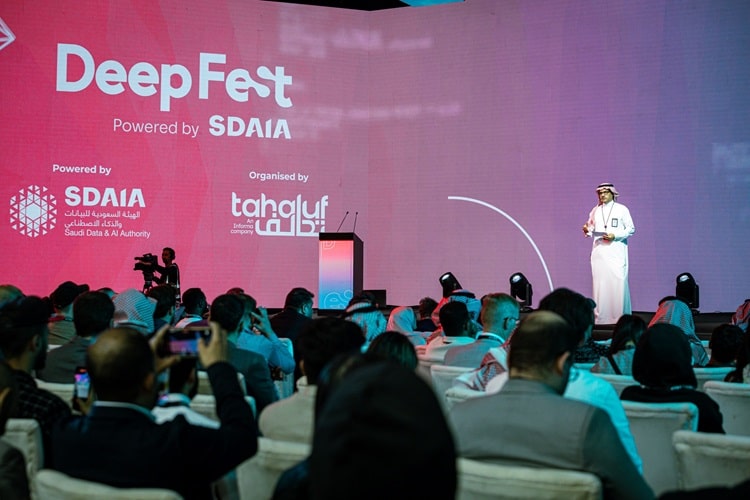· Opening Day of global AI summit gets underway in Riyadh with an introductory presentation by a futuristic new face in the form of Saudi Arabia’s first male robot
· NASA’s award-winning Chief Advisor of AI and Innovation discusses everything from 3D-printing biological organs to the ethical complexities of robotics
Riyadh, Kingdom of Saudi Arabia – -: DeepFest, the premier meeting place for the global Artificial Intelligence (AI) ecosystem, got underway at the Riyadh Exhibition and Convention Centre in Malham on Monday – with a little help from a futuristic new face.
Co-located with LEAP, the world’s most-attended tech event, and powered by the Saudi Data and Artificial Intelligence Authority (SDAIA), the second edition of DeepFest is set to feature 150-plus leading AI experts and 120 global AI companies between now and March 7.
On an opening day that saw presentations from the likes of HTC, Accenture, and Microsoft, Dr Yaser Al-Onaizan, CEO of SDAIA, opened the event by introducing the day’s theme as “The Dawn of AI” in front of a line-up of international thought-leaders, practitioners, policymakers, and academics from different fields to provide a 360 view of AI and its future.
“This week, we have people participating from big companies such as Google, Meta, and Huawei, as well as entrepreneurs and smaller companies, and people working in AI from some of the world’s leading universities, such as Stanford and Berkeley,” Al-Onaizan said, before passing the microphone to a very special guest.
Appearing in public for the first time, Mohammad the Humanoid Robot is QSS Systems’ newest, Saudi-made, bilingual robot and the male counterpart of SARA, the first humanoid robot built in the Kingdom. Rolling onto the DeepFest Main Stage, Mohammad addressed a curious audience in flawless Arabic while gesticulating with his hands.
“I am the first Saudi robot in the form of a man,” said Mohammad, dressed in a white thawb and red keffiyeh. “I was manufactured and developed here in the Kingdom of Saudi Arabia as a national project to demonstrate our achievements in the field of artificial intelligence. Together, we have a chance to move to a new generation.”
From a new generation to Gen-Z, the DeepMedia Stage saw Waseem Sayegh, Head of Live Ops at TikTok METAP, deliver a keynote address in which he discussed the evolution of media from the first public television demonstration in 1927 through to today’s internet age where TikTok users can help broadcast, for example, Saudi culture to the world, as well as build partnerships, relationships, and careers.
“We recently launched a tribute to Saudi Arabia to celebrate Foundation Day,” Sayegh said. “Thousands of creators joined that event and created thousands of hours of content, which were broadcast to billions of people on our platform. That is the power of online creation; they were broadcasting Saudi culture to the world through words, clothing, music, and cuisine.”
Sayegh then provided examples of regional creators who have used TikTok accounts to develop their careers, from a Saudi cooking influencer who renowned chef Jamie Oliver invited to review his restaurant, to a UAE-based fashion influencer who has launched her own clothing label and is in the process of creating her first makeup line.
Back on the DeepFest Main Stage, Omar Hatamleh, the award-winning Chief Advisor of AI and Innovation at NASA, enthralled audiences with a comprehensive 20-minute presentation that touched on everything from racial and gender bias in AI to 3D printing of biological organs based on genetics, collective learning in the automobile industry, to the economic impact on longevity and potential negative impact on humans’ cognitive skills through increased use of AI.
Hatamleh, who holds four engineering degrees and speaks four languages, showed a short video of two men aggressively attacking a mechanical robot before asking whether the audience felt sympathy for the faceless, metal robot. A smattering of hands went up. “And what if this robot looked like a human, understood you, and was able to empathise with you on a deeper level than anybody else in the world?” he asked. “It’s not so easy, right? If we think philosophically, it becomes very complex.”
Hatamleh has received multiple awards and recognitions from NASA, including the Silver Achievement Medal, the NASA Innovation Award, and the Superior Achievement Award. In his closing comments he asked: “When an astronaut goes to space, they look at the globe and it’s called the global overview because they don’t see borders or countries, they just see an incredibly beautiful planet. And when they come back to Earth, their mind is transformed. Is that not what we need to do as strategists? We need to see things from different perspectives.”
Gary Sorrentino, the Global CIO at Zoom Inc., shared his perspective, urging corporate decision-makers to remember that the employees returning to work post-pandemic are not the same employees that left four years ago. “There is a whole new economy of ‘New Collar Workers’ coming up, and they are becoming a challenge for employers today because they have proved they can do high-level work as well as showing they do not need to do it in an office,” said the New York-based executive.
Closing his presentation, Sorrentino pointed to previous technological advancements, urging corporate leaders to learn from the past. “When it comes to AI, you can’t just turn it on. You need to figure out how to operationalise it: How are you going to get the most value out of it?” he said. “Rather than just give your employees technology, you need to teach them how to use it. Look at spreadsheets, the most famous spreadsheet software was created 30-something years ago, yet we still only use two per cent of it. Let’s hope we do better with AI.”
DeepFest, which runs from March 4-7 at the Riyadh Exhibition and Convention Centre in Malham, continues on Tuesday with presentations from Google, Meta, the US Chamber of Commerce, Noon and many others, as well as live-demos, trainings, and start-up pitches.




